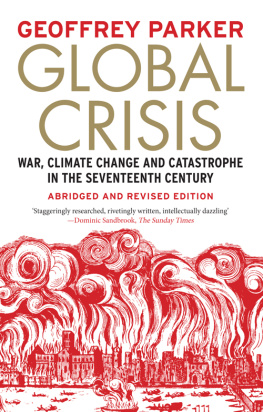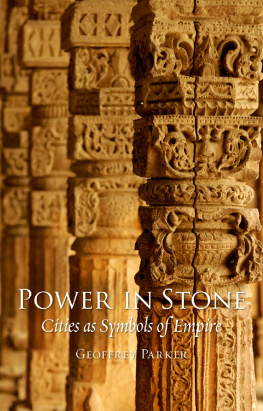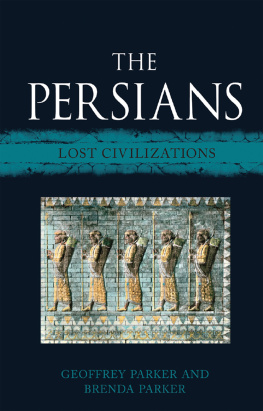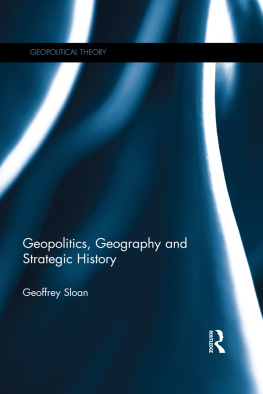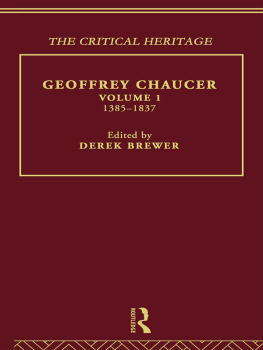ROUTLEDGE LIBRARY EDITIONS: POLITICAL GEOGRAPHY
Volume 11
THE GEOPOLITICS OF DOMINATION
THE GEOPOLITICS OF DOMINATION
GEOFFREY PARKER
First published in 1988
This edition first published in 2015
by Routledge
2 Park Square, Milton Park, Abingdon, Oxon, OX14 4RN
and by Routledge
711 Third Avenue, New York, NY 10017
Routledge is an imprint of the Taylor & Francis Group, an informa business
1988 Geoffrey Parker
All rights reserved. No part of this book may be reprinted or reproduced or utilised in any form or by any electronic, mechanical, or other means, now known or hereafter invented, including photocopying and recording, or in any information storage or retrieval system, without permission in writing from the publishers.
Trademark notice: Product or corporate names may be trademarks or registered trademarks, and are used only for identification and explanation without intent to infringe.
British Library Cataloguing in Publication Data
A catalogue record for this book is available from the British Library
ISBN: 978-1-138-80830-0 (Set)
eISBN: 978-1-315-74725-5 (Set)
ISBN: 978-1-138-81332-8 (Volume 11)
eISBN: 978-1-315-74708-8 (Volume 11)
Publishers Note
The publisher has gone to great lengths to ensure the quality of this reprint but points out that some imperfections in the original copies may be apparent.
Disclaimer
The publisher has made every effort to trace copyright holders and would welcome correspondence from those they have been unable to trace.
THE GEOPOLITICS OF DOMINATION
GEOFFREY PARKER
First published in 1988 by
Routledge
11 New Fetter Lane, London EC4P 4EE
Published in the USA by
Routledge
in association with Routledge, Chapman & Hall, Inc.
29 West 35th Street, New York, NY 10001
1988 Geoffrey Parker
Printed and bound in Great Britain by Mackays of Chatham Ltd, Kent
All rights reserved. No part of this book may be reprinted or reproduced or utilized in any form or by any electronic, mechanical, or other means, now known or hereafter invented, including photocopying and recording, or in any information storage or retrieval system, without permission in writing from the publishers.
British Library Cataloguing in Publication Data
Parker, Geoffrey, 1933
The geopolitics of domination.
1. Geopolitics Europe
I. Title
320.12094 D104
ISBN 0-415-00483-7
Library of Congress Cataloging-in-Publication Data
ISBN 0-415-00483-7
CONTENTS
The attempts by certain states to achieve and retain a position of dominance over others has been a recurrent feature of world political history. One of the most important expressions of this has been territorial the urge to secure control over large areas and so to establish empires of over-whelming size and power. In order to reach a deeper understanding of the international scene, both past and present, it is essential to address the question of the nature and causes of this urge to dominate. It has been associated with, among other things, political ambition, religion, militarism and greed. Perhaps above all it has been associated with the rise of the charismatic leader, the great man who has taken his people in pursuit of some real or imagined destiny, and in so doing has set his imprint upon the age.
While these causes of the phenomenon of territorial dominance have deservedly been examined and debated with considerable vigour, specifically geographical aspects of the phenomenon have received far less attention. There has, it is true, been a nod in the direction of the geographical background, as though it were the stage set against which the action has taken place. However, little attempt has been made to examine holistically the geopolitical structures of those states which have attained positions of dominance, with a view to discovering what light such structures may be able to shed on the matter. The main purpose of this book is to attempt to rectify this omission.
While the object of study is the phenomenon of territorial dominance as a whole, this book will confine itself to an examination of its occurrence in the European and Mediterranean area the western ecumene since the Renaissance. It entails an examination of the geopolitical structures of those particular states which successively have succeeded in achieving a commanding position within it, and have then aspired to become the universal state. The particular states which have been considered as coming into this category are the Ottoman Empire, Spain, Austria, France and Germany. During the nineteenth century Great Britain achieved a position of overwhelming world dominance, but it was not a territorial one so far as Europe was concerned, so it has not been included in this study. The Russian Empire and the Soviet Union are examined with a view to discovering the incidence of dominant state characteristics which they display, and relating this to both Russian and Soviet international behaviour. The basic question being addressed is this: Is there a specific geopolitics of territorial dominance and, if so, to what extent does it help us to a better understanding of the whole phenomenon?
I acknowledge with gratitude the assistance given me during the writing of this book by the Royal Geographical Society and by the University of Birmingham. From the outset my wife, Brenda, has been an active participant and partner in the enterprise, and both her wide knowledge and her critical eye have made her willingly given advice and assistance invaluable.
Geoffrey Parker
Lichfield
Life is a continuous sequence of dominations, said the President of the General Assembly of the United Nations in his speech to the Second Session in 1947.[1] The attempts by some states to achieve and retain positions of dominance have done much to shape the outlines of the world political map. The resistance of others to such domination, and their refusal to accept its consequences, has been a factor of equal importance. The United Nations, like the League of Nations before it, was originally established after a disastrous war in which certain great powers sought to achieve positions of dominance. In essence it represented the refusal of the states of the world to accept such domination, and an assertion, in an admittedly halting and uncertain manner, of their right to freedom and self-determination.
The opposing desires to control and to resist, to dominate and to be free from domination have acted dialectically upon one another throughout modern times. Geopolitically, they have been responsible for what Henrikson referred to as the neatly segmented, multicoloured world of the standard political map.[2] Nowhere is the complexity of this more in evidence than in Europe and the Mediterranean, the western ecumene of the World-Island.[3] While the political map here is a palimpsest, retaining considerable evidences of older and largely superseded political forms, the standard units are now the neatly segmented territorial states. Known, usually quite wrongly, as nation-states or simply as nations, their preponderant cultural unity has been used as a basis for political unity and for the centralisation of control over a wide range of activities. As part of the process of control, qualities have been attributed to the state well in excess of those which it actually possesses. In this way popular support, sometimes of a highly emotional character, is gained for its continued existence and for the regime which controls it. This nationalism may then supply the emotional and intellectual foundations for a further enlargement of the state, and thus for the commencement or continuation of an expansionist process. Its initial object, whether consciously expressed or not, is to attain some ideal or idealised geographical territory in which the state will be in close conformity with the physical and human environment in which it exists. This entails the attainment of a territory in which there is a large measure of physical unity bounded by clearly defined natural frontiers. Such conditions constitute the physical basis for what is envisaged as a more secure, prosperous and easily-governed state. Its ultimate justification has been expressed as the creation of that particular morphology which God, Nature or Reason was deemed to have ordained for it. Such a morphology may take the form of a homogeneous geographical area, a region of physical unity, an amorphous living space or a shape which can be reduced to a geometrical figure, such as a triangle or a hexagon. Perhaps the most powerful factor of all underlying the search for the ideal morphology has been the myth of a national golden age in which there was fulfilment and glory within a large and impressive homeland. Goblet saw this as super-imposing maps of dreamland empires upon far bleaker contemporary realities,[4] a phenomenon which Kristof called the shift towards an idealised past when the fatherland and people were true to themselves.[5] Whether it was space or time which was invoked, the central theme was what Ratzel called the Staatsidee, a philosophical and moral conception of the mission and destiny of the state and the image of what it should become.[6] The nature of the national territory, and the natural environment occupied by the people then become woven into the fabric of the cultural heritage.





